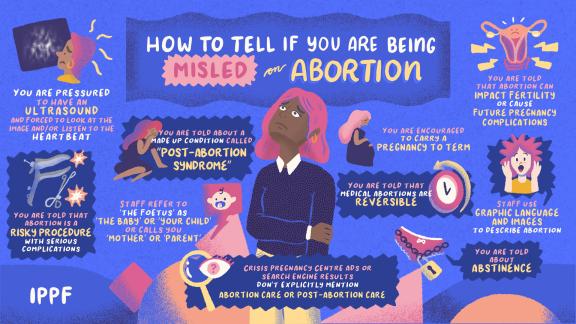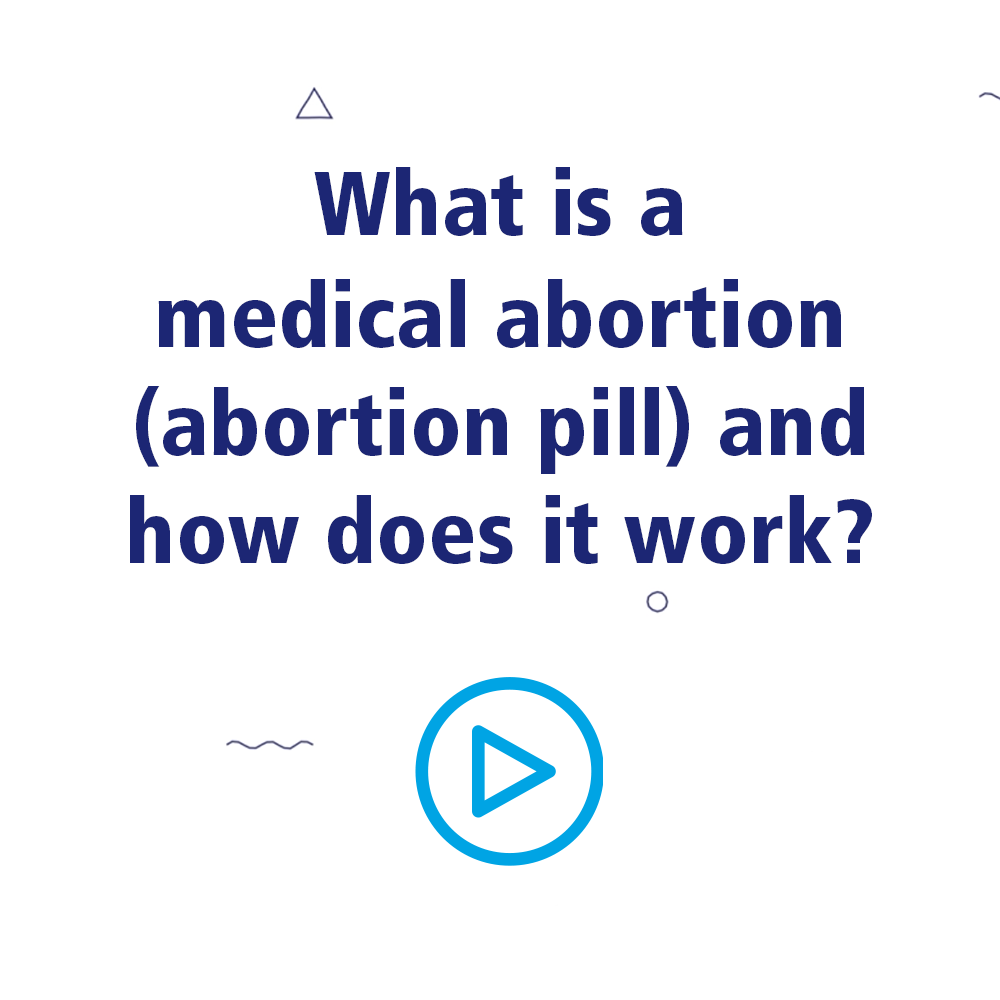Around the world, ‘crisis pregnancy centers’ present themselves as neutral health facilities, while masking their anti-abortion and religious agendas for people seeking information about abortion.
Often funded by extreme anti-abortion groups in the United States and elsewhere, crisis pregnancy centers aim to stop people from choosing to have an abortion. They often register themselves as Christian charities, as opposed to medical providers, meaning they can’t be regulated by government health ministries.
By discouraging, denying and actively preventing access to abortion, these centers are placing women and others who can get pregnant in direct harm and putting their lives at risk.
Here are some ways to detect abortion dis- and misinformation, with tips on where to go for accurate, reliable information and compassionate care.
Crisis pregnancy centers use paid ads to appear alongside regulated abortion care providers
When searching for abortion care online, be aware of any disclaimers associated with search results. Google has now added disclaimers to ads where it will clearly state if the clinic provides abortion care or not.
If you’re still unsure if they provide abortion care, here are a few steps you can do before you decide to visit:
- Contact the clinic in advance, asking specifically if they provide abortion care services and details about the procedure. If they refuse or are unable to confirm that they provide abortion services, and if they cannot answer questions related to the procedure, it is safe to assume they do not provide safe abortion care.
- Visit their website. If they don’t mention abortion services or provide any details related to the procedure, it’s probably because they don’t provide abortions.
- Reading reviews on Google and on their social media related to their abortion care services can also help you make a more informed decision.
These small digital due diligence steps could help you avoid crisis pregnancy centers. If you or someone you know needs an abortion, click here for information.
You are pressured to have an ultrasound and forced to look at the image and/or listen to the heartbeat
Ultrasound scans from a qualified technician are sometimes necessary to assess how many weeks pregnant you are. But ultrasound technicians should never pressure or force you to look at the scan images or listen to the fetal heartbeat (though in some countries or states it may be a legal requirement). You can always ask who will carry out the diagnostic scan and how qualified they are. If your scan is being performed by a sonographer, you can ask what training they've had and if they are on a register.
You are told that medical abortions are reversible
Medical abortions can consist of two types of medication: mifepristone and misoprostol. Mifepristone works by blocking progesterone - a hormone necessary to maintain a pregnancy - while misoprostol works by causing the uterus to contract and empty.
Anti-abortion groups like Heartbeat International, which has ties to the US political right, promote something called the Abortion Pill Rescue Network where people who have taken the first dose of mifepristone (aka the abortion pill) are referred to medical professionals to ‘reverse’ the effects of the pill. An unethical and unproven treatment, it involves giving an individual progesterone after ingesting the first pill in the two-pill medication abortion treatment to stop the abortion. In reality, this method doesn’t work and it could potentially be dangerous.
You are told about a made up condition called ‘post-abortion syndrome’
This is a false claim that links abortion to mental illness and has been widely discredited by medical experts. Abortion poses no mental health risks, and no greater risks than carrying an unintended pregnancy to term.
You are given leaflets about surrogacy, adoption or homosexuality and encouraged to carry a pregnancy to term
Staff at crisis pregnancy centers don’t always wait for pregnant people to come to them - sometimes they go directly into schools and communities to distribute flyers about adoption to early-stage pregnant people before they visit a clinic that offers abortion care.
At the clinic, staff may share these leaflets under the guise of providing alternative ‘options’ to pregnant people, or falsely claiming that abortion can lead to homosexuality, when in reality they are used to undermine a person’s bodily autonomy.
Nurses, doctors and counsellors use graphic language and images to describe abortion
This is a tactic used to scare pregnant people out of having an abortion. You should never be shown graphic images of a fetus or bloody medical equipment as part of a counselling session with an abortion care provider.
Before consenting to an abortion, a nurse or counsellor should explain what is involved in the abortion procedure, possible side effects to expect and how these can be managed.
when
Subject
Abortion Care

Staff at crisis pregnancy centers don’t always wait for pregnant people to come to them - sometimes they go directly into schools and communities to distribute flyers about adoption to early-stage pregnant people before they visit a clinic that offers abortion care.

You are told that abortion can impact fertility or have major ramifications on future pregnancies
These claims are untrue, not supported by the mainstream medical community and have been refuted by health agencies. Abortion does not increase the risk of pregnancy complications if you do choose to get pregnant again.
You are told that abortion is a risky procedure with a likelihood of serious complications
Abortion is a very safe procedure when carried out by a trained health worker or when self-managed using quality medical abortion pills. Serious complications and death from safe abortion are extremely rare. In fact, carrying a pregnancy to term carries significantly more risks than having an abortion.
The counsellor refers to ‘the foetus’ as ‘the baby’ or ‘your child’ or calls you ‘mother’ or ‘parent’
This is a psychological tactic used to manipulate the pregnant person and impose maternal feelings to encourage them to carry the pregnancy to term. A trained health care professional will use medically correct terms when speaking to you about pregnancy and abortion, either referring to an embryo or foetus.
You are told about abstinence as the only option for preventing pregnancy
Many anti-abortion and religious groups will encourage abstinence as an effective way to ‘postpone’ pregnancy and will denounce the efficacy of modern contraception like condoms, IUDs or injectables.
You should be offered the chance to talk about contraception at the time you have the abortion, as you could get pregnant almost immediately after an abortion if you’re not using contraception. To learn more about the different contraception options and to find the best one for you, click here.
Abortion is healthcare. If you or someone you know is pregnant and looking for accurate and reliable information about abortion care, click here or visit the Safe Abortion Action Fund website.
Cover illustration by Claudine Delfin for IPPF













